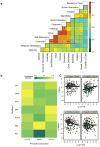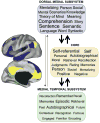The default network and self-generated thought: component processes, dynamic control, and clinical relevance
- PMID: 24502540
- PMCID: PMC4039623
- DOI: 10.1111/nyas.12360
The default network and self-generated thought: component processes, dynamic control, and clinical relevance
Abstract
Though only a decade has elapsed since the default network (DN) was first defined as a large-scale brain system, recent years have brought great insight into the network's adaptive functions. A growing theme highlights the DN as playing a key role in internally directed or self-generated thought. Here, we synthesize recent findings from cognitive science, neuroscience, and clinical psychology to focus attention on two emerging topics as current and future directions surrounding the DN. First, we present evidence that self-generated thought is a multifaceted construct whose component processes are supported by different subsystems within the network. Second, we highlight the dynamic nature of the DN, emphasizing its interaction with executive control systems when regulating aspects of internal thought. We conclude by discussing clinical implications of disruptions to the integrity of the network, and consider disorders when thought content becomes polarized or network interactions become disrupted or imbalanced.
Keywords: autobiographical; default; mind-wandering; psychopathology; self; social.
© 2014 New York Academy of Sciences.
Figures





References
-
- Schooler JW, et al. Meta-awareness, perceptual decoupling and the wandering mind. Trends Cogn Sci. 2011;15:319–326. - PubMed
-
- Smallwood J. Distinguishing how from why the mind wanders: A process–occurrence framework for self-generated mental activity. Psychol Bull. 2013;139:519–535. - PubMed
-
- Baird B, et al. Inspired by distraction: Mind wandering facilitates creative incubation. Psychol Sci. 2012;23:1117–1122. - PubMed
-
- Killingsworth MA, Gilbert DT. A wandering mind is an unhappy mind. Science. 2010;330:932. - PubMed
-
- Smallwood J, Schooler JW. The restless mind. Psychol Bull. 2006;132:946–958. - PubMed
Publication types
MeSH terms
Grants and funding
LinkOut - more resources
Full Text Sources
Other Literature Sources
Medical

